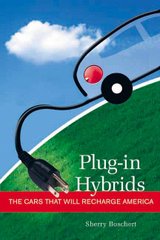Proposition 87, the much ballyhooed California Initiative to levy a new oil extraction tax and use the revenue to support alternative fuels, went down to defeat in the recent election. One can’t overstate the impact of the $100 million oil-fueled campaign by opponents. “Higher gas prices. More foreign oil.” The refrain still rings in my ears. Oil companies made a smart investment to keep $4 billion for themselves.
But the Yes on 87 campaign squandered a great opportunity. The campaign spent $10s of millions in pursuit of the worthy goal of promoting alternatives to petroleum. Unfortunately the ads focused on promoting ethanol with a disconnected nod to solar and wind. The campaign, I would argue, that could have won, and would have educated even in losing, would have made clear the connection between popular renewables (solar and wind-generated electricity) and plug-in cars. If interest in the EAA PHEV project is any indication, current hybrid owners are ready to plug in. The moment was ripe to make the PV/EV connection big time.
Unfortunately for the campaign, doubts about biofuels have bubbled into the mainstream through publications such as Consumer Reports ( ). Ethanol has always had the sniff of corporate scam, and the involvement of venture capitalists as major promoters of Prop 87 only tainted the initiative.
The effort failed after early polling had it ahead, and public understanding of the choices we face to reduce petroleum usage remains unchanged. An electorate inclined to support environmental issues voted down a tax on the most polluting and richest corporations in the world.
The public understandably remains confused about clean cars. Gov. Schwarzenegger was still touting last year’s fashion, hydrogen, in his ads. Democrats seemed to pivot to ethanol. Who Killed the Electric Car? suggested plug-in cars are still viable. Car companies tout new gasoline cars as nearly zero emissions but the air is still unhealthy where most people live. And environmental leaders continue to express a preference for no preference. Sprinkle one part hydrogen, one part ethanol, one part clean diesel, one part bio diesel, and one part gasoline generated electricity into a mug of CAFE, stir and hope we end up with something better.
Prop 87 failed because political and environmental leadership has failed to heed the science and promote plug-in cars. The continued unwillingness of auto makers to create product to connect to the ubiquitous electric infrastructure is no excuse for keeping the public misinformed. Had the initiative’s promoters’ given equal billing to plug-ins and still lost, we would have gained considerable ground. If there’s a next time, let’s hope they take our advice.
Tuesday, November 28, 2006
Subscribe to:
Post Comments (Atom)



No comments:
Post a Comment